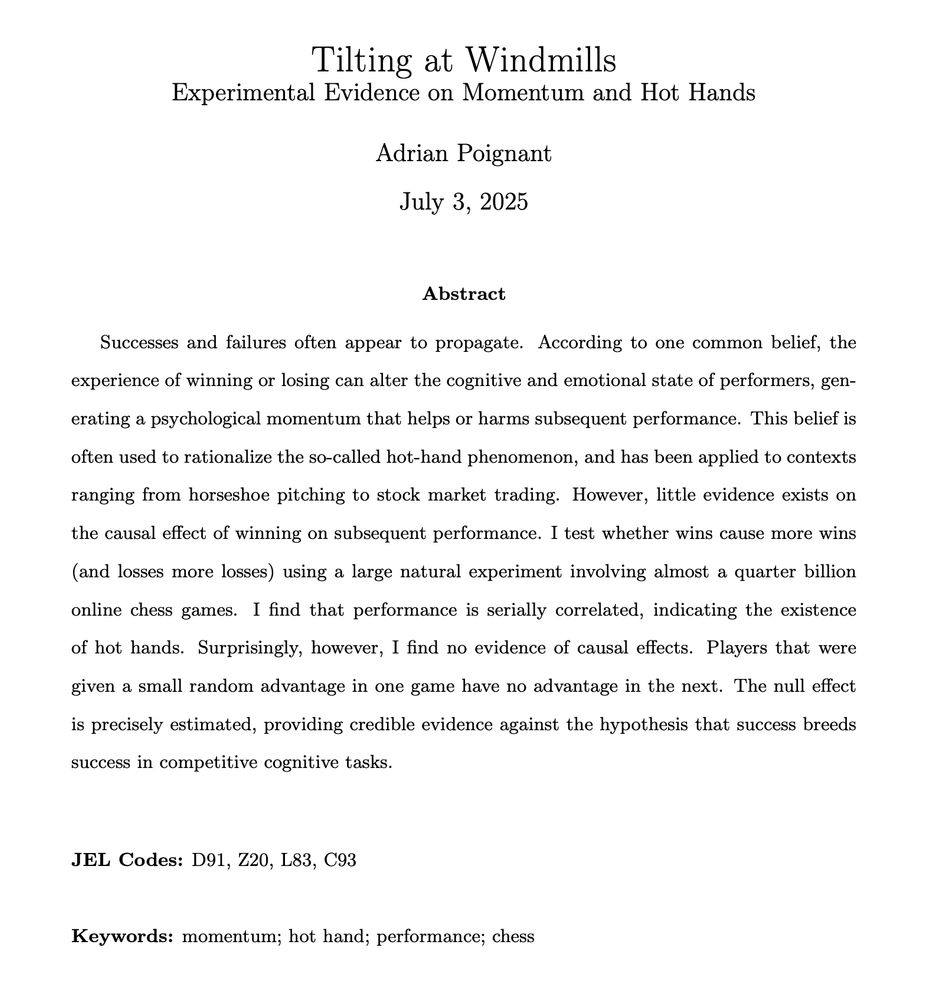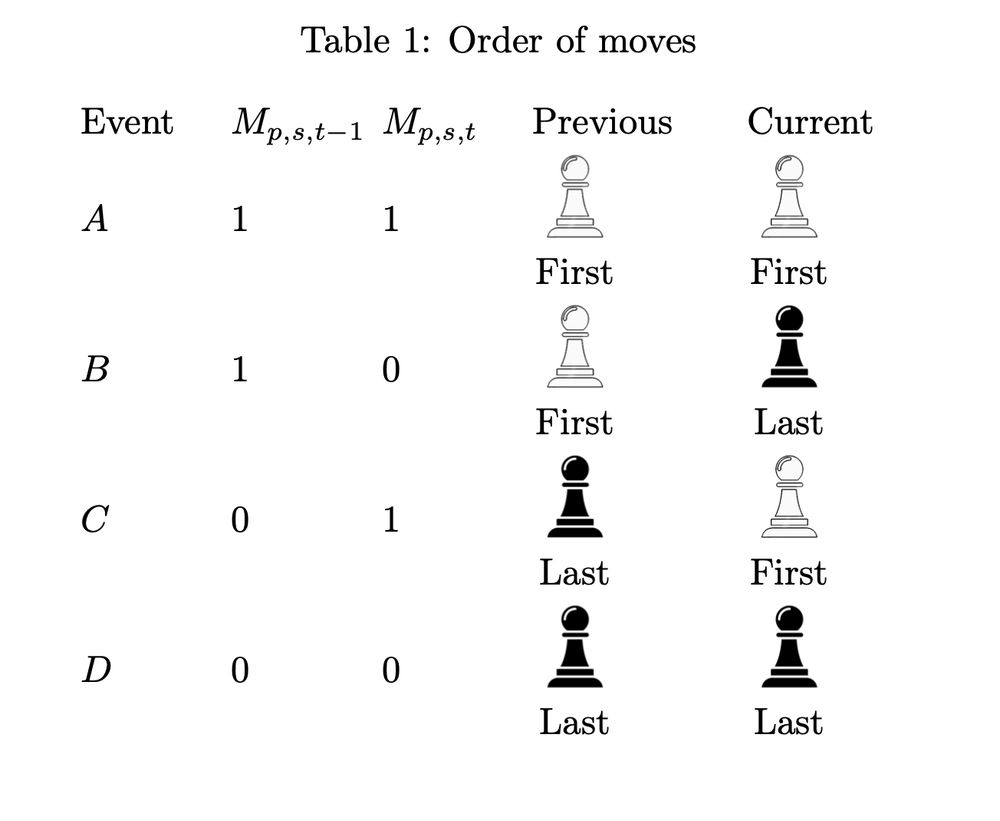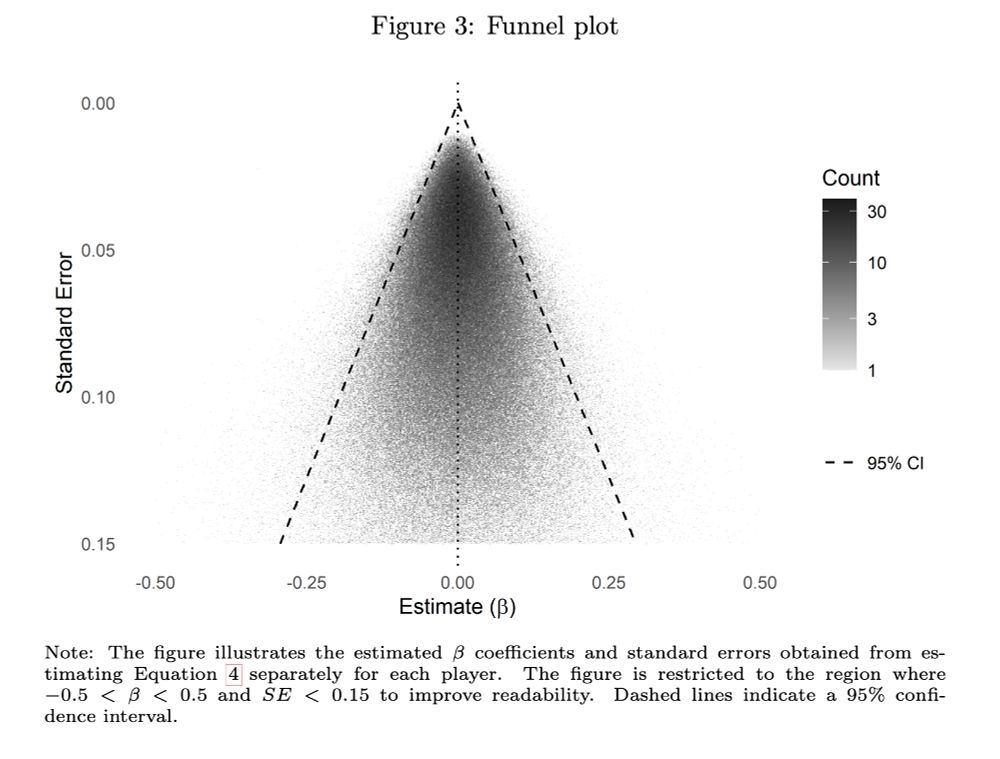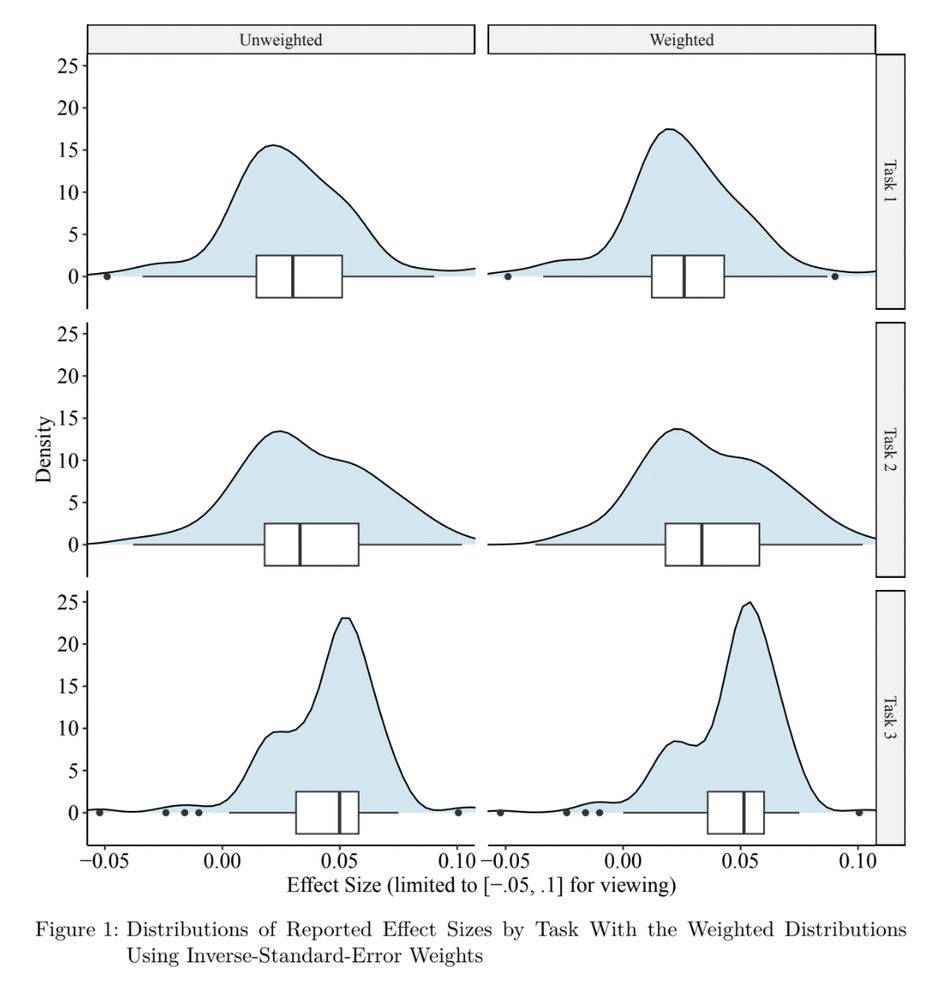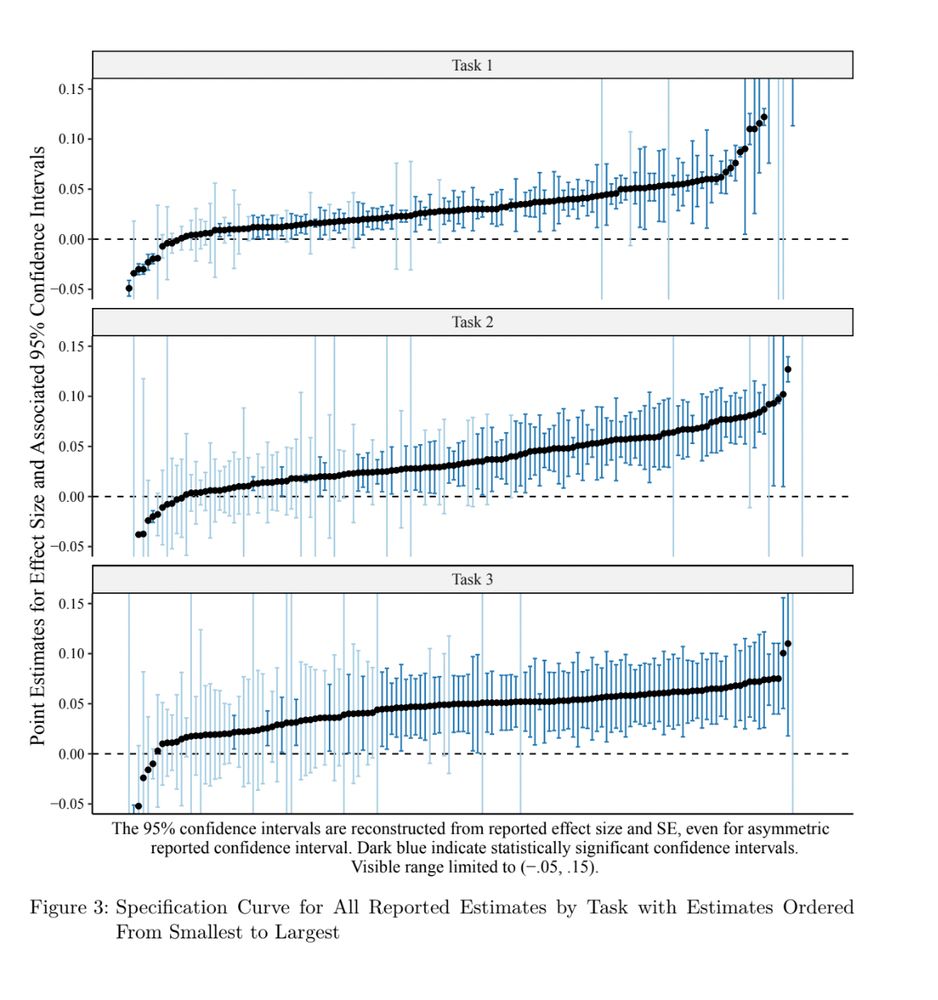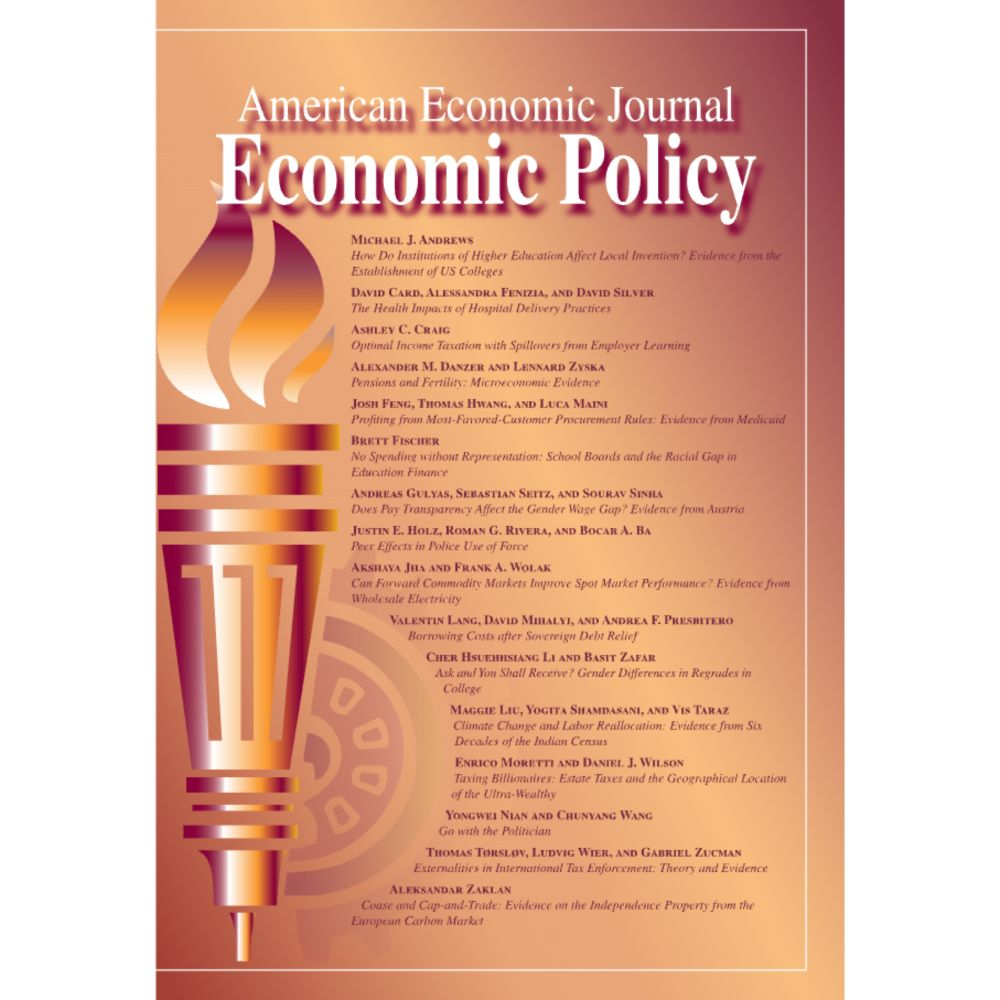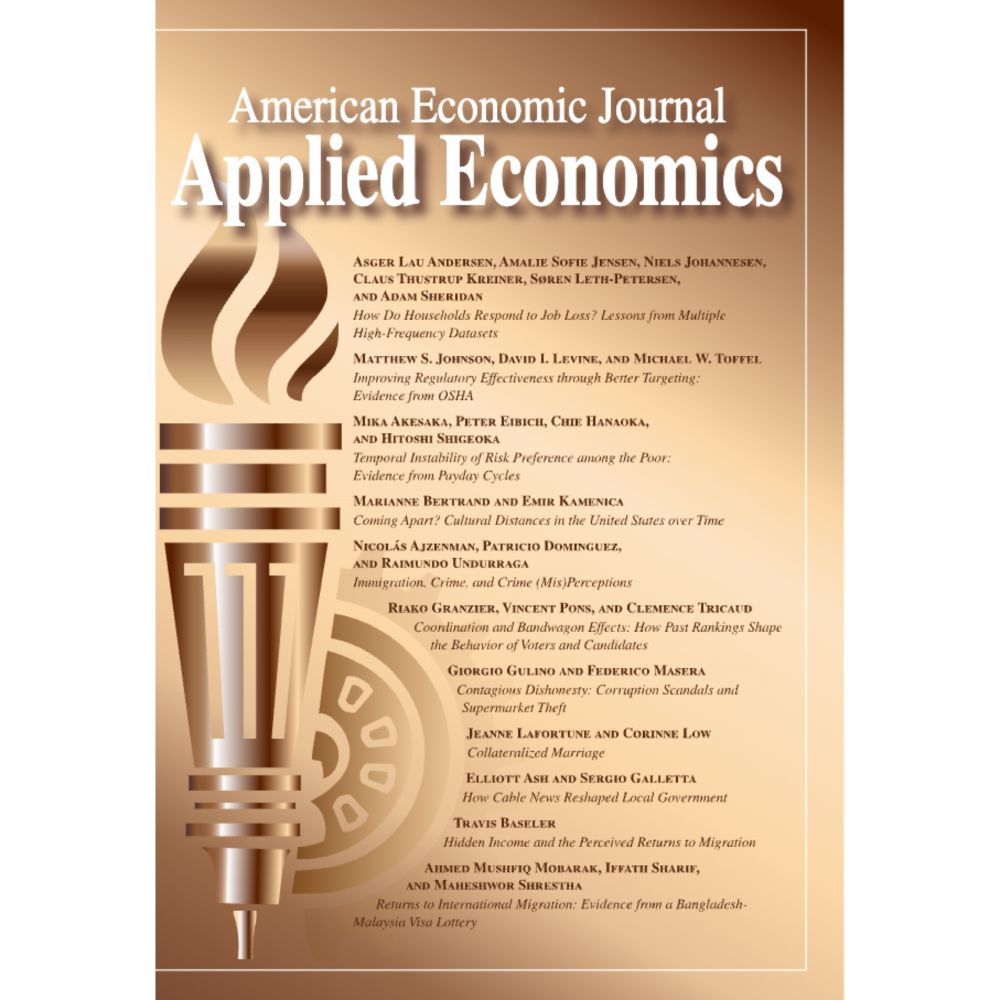
We are recruiting a Canada Impact+ Research Chair in Climate‑Based Risk Management in Food & Agriculture—up to $8M over 8 years for work in climate risk, ag/environmental economics, finance, and modeling.
Apply/share: viprecprod.ad.umanitoba.ca/default.aspx...
More info: umanitoba.ca/research/res...
29.01.2026 14:55 — 👍 2 🔁 1 💬 0 📌 0
A little bit late, but I'm looking to hire a postdoc at Cornell to measure the private value of soil health improvements in US ag. A 2-year gig.
Well suited for an ag/resource economist or data scientist w/ interests in soil health and solid programming & econometric chops.
ad coming soon!
14.01.2026 21:05 — 👍 7 🔁 4 💬 0 📌 0
Drought influences human-wildlife conflict in California, very cool paper! Results seem consistent with our work on human-wildlife conflict in BC: papers.ssrn.com/sol3/papers....
15.11.2025 19:03 — 👍 2 🔁 1 💬 0 📌 0

📢 Out now in the 🍁November 2025 issue🍁of #JAERE! 📢
"Hotelling Meets Wright: Spatial Sorting and Measurement Error in Recreation Demand Models" by Jacob T. Bradt ( @jtbradt.bsky.social ).
Read it here: buff.ly/3YiBhqQ
📈📉 #Econsky
12.11.2025 13:01 — 👍 5 🔁 3 💬 0 📌 0

We are hosting virtual Replication Games on Friday November 13th, 2025 with @ukrepro.bsky.social ro.bsky.social. This is our 2nd year collaborating with UKRN. Psych, public health, pol sci and econ studies will be reproduced!
Register here: www.surveymonkey.ca/r/I4R_Replic...
20.10.2025 18:20 — 👍 5 🔁 4 💬 0 📌 2

ABSTRACT
This article examines how political messengers, and not the message, influence attitudes toward renewable energy infrastructure amid an increasingly polarized climate change debate. Focusing on wind power, a highly politicized issue, and solar energy, less contentious, we conducted an experimental survey in Germany. We assess how either a far-right or an environmentalist critic affect acceptance of renewables. Importantly, our analysis examines support for renewables in forest areas, focusing on a conflict between climate action and local environmental protection. Our findings reveal that the messenger impacts attitudes regarding wind energy. Criticism of wind turbine expansion by an environmentalist actor leads to greater rejection, while a similar critique by a far-right actor results in increased acceptance, i.e. a backlash effect. No such influence was found for solar energy. We explain these diverging findings by differences in politicization. Our findings have important consequences for understanding key dynamics of the public debate and political conflict over climate action.
New article!
Climate action versus environmental protection? How far-right and environmentalist messengers shape public attitudes towards renewable energy infrastructure in forests, by @manesweisskircher.bsky.social and Matthias Diermeier.
doi.org/10.1080/0964...
09.10.2025 06:26 — 👍 22 🔁 8 💬 2 📌 0
🚨I4R is looking to hire postdoc fellows in public health and computer science!
The postdoc will join a team of researchers and help mass reproduce studies in leading public health journals or develop AI replicator agents.
Info 👇
30.09.2025 18:18 — 👍 17 🔁 18 💬 1 📌 2


I’ve got a new working paper with @danielavidart.bsky.social, hot off the press. We develop a new method for measuring the risk preferences of agents in the past, and apply it to the U.S. from 1890-1920.
Check it out! Feedback is welcome.
www.dropbox.com/scl/fi/chcof...
16.08.2025 18:34 — 👍 44 🔁 13 💬 4 📌 1
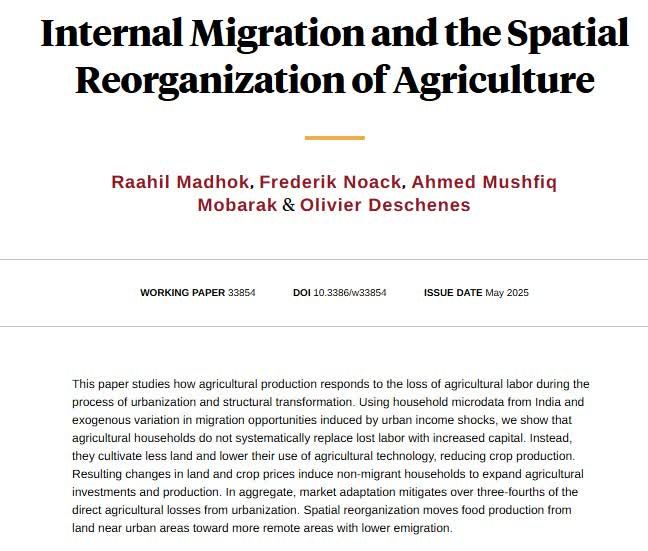
Migrating to new economic opportunities in cities, rural Indian families don't mechanize, they downsize their farms. Their neighbors produce more as land and crops markets adjust, from @raamadhok.bsky.social, Noack, Mushfiq Mobarak, and Deschenes https://www.nber.org/papers/w33854
01.06.2025 11:00 — 👍 8 🔁 2 💬 0 📌 1
(2) We have launched a new tool: Paper Skygest Bookmarks! This is a list of posts about papers that you have liked. You need to like the post *containing the url*; it doesn’t matter whether you like the post while using Skygest.
21.05.2025 18:33 — 👍 55 🔁 7 💬 4 📌 5
Hi Skygesters! We have 2 updates.
(1) We are starting to do research to improve and study Skygest and want everyone on board! See our thread here for details regarding data and consent.
21.05.2025 18:33 — 👍 53 🔁 6 💬 1 📌 1
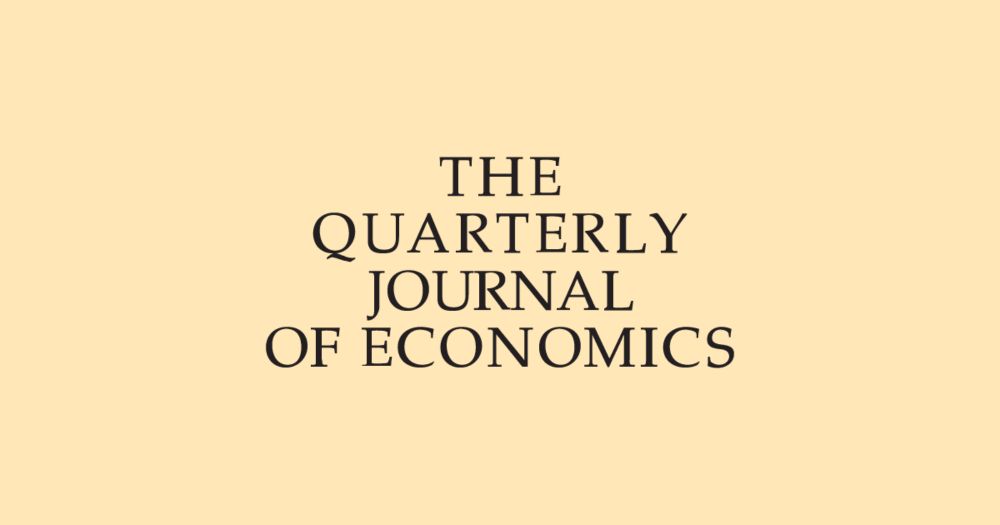
Lives Versus Livelihoods: The Impact of the Great Recession on Mortality and Welfare*
Recently accepted by #QJE, “Lives Versus Livelihoods: The Impact of the Great Recession on Mortality and Welfare,” by Finkelstein, Notowidigdo (@profnoto.bsky.social), Schilbach, and Zhang: doi.org/10.1093/qje/...
15.05.2025 15:13 — 👍 19 🔁 5 💬 0 📌 0

All of my top 6 camping spots on the planet burned to the ground in out of control forest fires this week.
Climate change is here and the impacts are brutal.
14.05.2025 18:37 — 👍 11 🔁 4 💬 1 📌 1


You probably know that randomized controlled trials (RCTs)--wherein some randomly assigned treatment is compared to some randomly assigned control--play a huge role in science.
It's hard to imagine where we'd be without them.
But here are a few historical facts that you might not know about RCTs.
08.05.2025 15:27 — 👍 10 🔁 1 💬 2 📌 0

✨ Just accepted ✨ in JAERE:
"Group size and threshold uncertainty in common-pool resource dilemmas" by Philip Brookins and Weston Watts
Read it here: www.journals.uchicago.edu/doi/10.1086/...
#EconSky 📈 📉
28.04.2025 12:03 — 👍 2 🔁 2 💬 0 📌 0

🆕 Just accepted 🆕 in JAERE:
"The Distributional Consequences of Incomplete Regulation" by Danae Hernandez-Cortes (@hernandezcortes.bsky.social)
Read it here: www.journals.uchicago.edu/doi/10.1086/...
#EconSky 📈 📉
23.04.2025 12:03 — 👍 15 🔁 7 💬 0 📌 0

Camp Resources XXXI
Call for Abstracts
We invite graduate students and young professionals to submit research abstracts to Camp Resources XXXI, which will be held August 3-5, 2025 at the Cambria Downtown Asheville Hotel. The workshop will begin with a reception on Sunday evening, August 3rd, with presentations starting early Monday morning, August 4th and concluding mid-afternoon on Tuesday, August 5th.
Presentation Formats & Travel Support
Camp Resources is a workshop designed for graduate students and young professionals to present their research in a relaxed but serious environment. We do not expect a paper. However, a clear, well-organized, twenty-minute presentation describing a completed or emerging research project has been standard fare. We also include shorter, 8-minute research sketches that are ideal for students in the early stages of dissertation work.
Through the generous support of NC State’s Center for Environmental and Resource Economic Policy, the Journal of Environmental Economics and Management, the Alfred P. Sloan Foundation, Resources for the Future, Industrial Economics, and Georgia Tech’s School of Economics, we will partially defray travel expenses for those giving regular presentations and, in a more limited way, those giving research sketches.
All graduate students, young professionals, and faculty are invited to attend, although we cap attendance at 70 people. A modest registration fee will be charged.
Submission Information
Short abstracts not more than 500 words may be submitted at:
https://go.ncsu.edu/camp_resources.
To receive full consideration, you must submit by Friday, May 23, 2025. You will be asked to include a short, 2-page vita with your abstract. We will notify presenters of accepted abstracts by June 9th.
Questions? Contact enviro_econ@ncsu.edu or Roger von Haefen at roger_von_haefen@ncsu.edu.
JEEM is happy to be a sponsor of Camp Resources XXXI in Asheville, NC. #econsky
Graduate students and young professionals, be sure to submit your abstracts by May 23.
Details here: cenrep.ncsu.edu/events/camp-...
21.04.2025 20:10 — 👍 6 🔁 4 💬 0 📌 0

🌬️ Just accepted 🇧🇷 in JAERE:
"The Effects of Renewable Energy Projects on Employment: Evidence from Brazil" by Danae Hernandez-Cortes (@hernandezcortes.bsky.social) and Sophie Mathes (@s-mathes.bsky.social)
Read it here: www.journals.uchicago.edu/doi/10.1086/...
#EconSky 📈 📉
21.04.2025 12:02 — 👍 21 🔁 8 💬 0 📌 1

💵 Just accepted 💵 in JAERE:
"Anticipatory cash transfers in the context of weather disasters" by Lukas Mogge (@lukasmogge.bsky.social), Julian Roeckert, and Kati Kraehnert
Read it here: www.journals.uchicago.edu/doi/10.1086/...
#EconSky 📈 📉
14.04.2025 12:03 — 👍 8 🔁 1 💬 0 📌 2
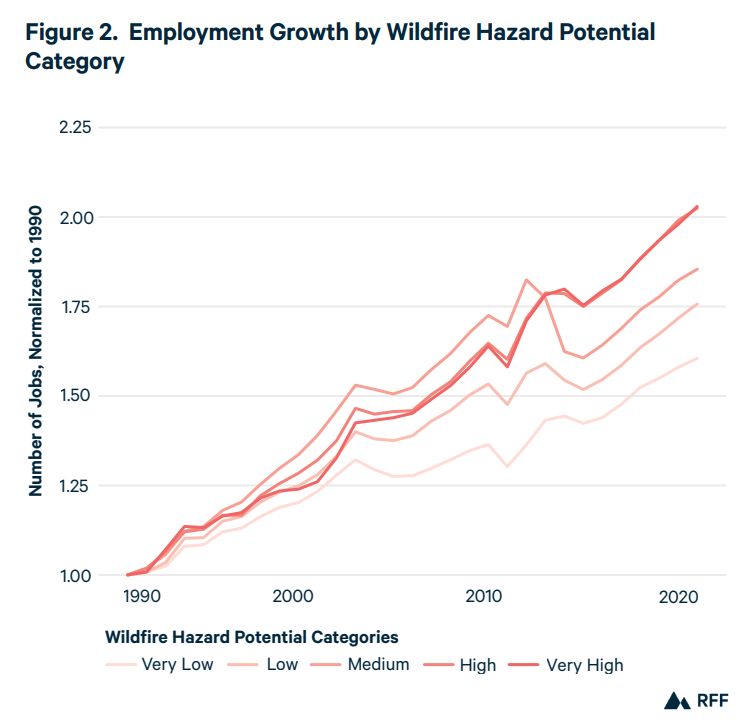
One consequence of restrictive development in urban cores:
Most of the employment growth in the western US since 1990 has taken place in high wildfire hazard areas.
Via Joiner, Walls, Wibbenmeyer 2025.
media.rff.org/documents/Re...
14.04.2025 18:22 — 👍 3 🔁 1 💬 0 📌 0
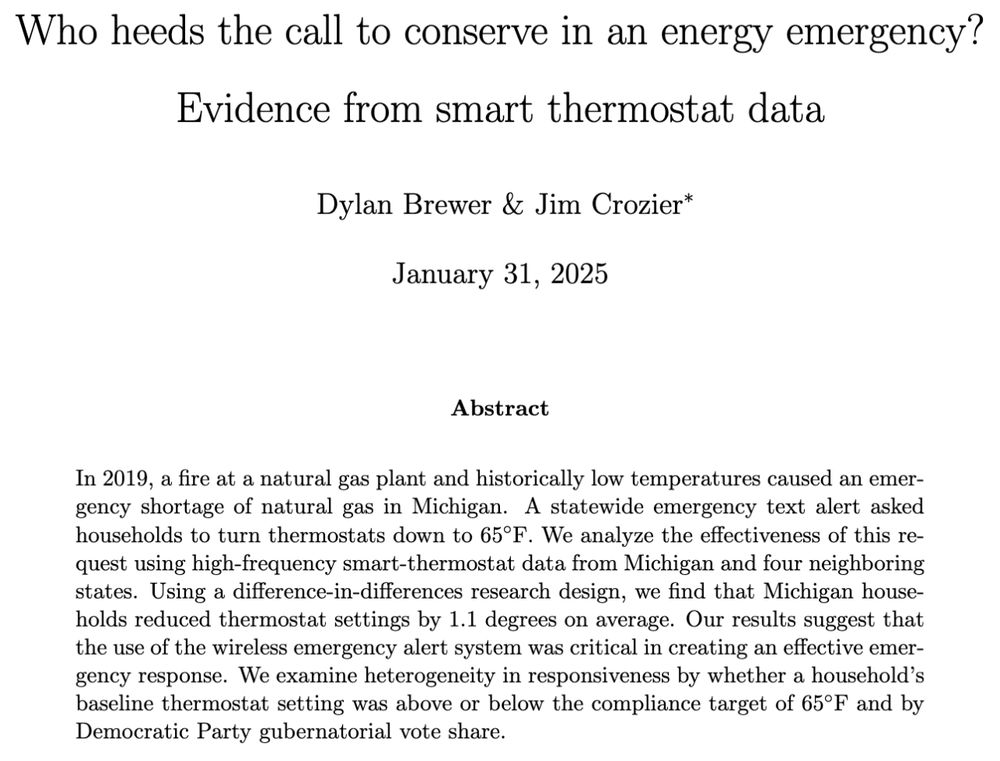
🌡️ Just accepted 🌡️ in JAERE:
"Who heeds the call to conserve in an energy emergency? Evidence from smart thermostat data" by Dylan Brewer and Jim Crozier
Read it here: www.journals.uchicago.edu/doi/10.1086/...
#EconSky 📈 📉
09.04.2025 12:01 — 👍 6 🔁 1 💬 0 📌 0
Associate Professor of Economics and Deputy Director of the Development Policy Centre at the ANU | Research on development, labor, trade, and the environment | Personal account, usual disclaimers
www.ryanbedwards.com
Incoming Asst. Prof @ UBC Zoology (Fall 2026)! Currently a Postdoc @ UCLA + UC Davis. Studying impacts wildfires 🔥 and climate change 🌎 on wildlife 🐻 and conservation ✊🏿🏳️🌈
Raising kids & bread & grant money. Cleaning data & diapers & fish. EA (bed nets, not light cone). Social scientist. typos. twitter.com/ryancbriggs
data, causal inference, experiments, politics
https://mattblackwell.org
political scientist at FSU; experimental design, inference (frequentist and Bayesian), metascience
Web: https://www.carlislerainey.com
Google Scholar: https://scholar.google.com/citations?user=otXLf3
Professor @sciencespo @ScPoEcon #econometrics #education
https://sites.google.com/site/clementdechaisemartin/
Associate Professor of Strategy & Innovation | Co-founder of causalscience.org | Associate Editor at Journal of Causal Inference | Executive Team at Academy of Management TIM Division
Official BlueSky account of the Association of Environmental and Resource Economists.
Our journal posts are presented with #JAERE and #REEP.
Provost Prof. of Economics (UMass Amherst).
Inequality, labor market policies and competition.
Affiliations: NBER, IZA, MIT Shaping the Future of Work Initiative
Preorder my book, The Wage Standard: https://www.thewagestandard.com
Associate Professor of Public Policy, Politics, and Education @UVA.
I share social science.
World-class research happens here 🔬
Join us as we discover the unknown + invent the future 🪐
Development economist, @Yale / @UniofOxford / @MIT. Asso editor, REHO + CER. Editorial board member, BMC Public Health + PloS One. Structural transformation, agriculture, gender, IPV. Views my own
The Agricultural & Applied Economics Association (AAEA) is a not-for-profit association serving the professional interests of members working in agricultural and broadly related fields of applied economics.
Assistant Professor @ Nelson Institute for Environmental Studies, UW Madison
Remote Sensing + Machine Learning for Ag/Dev econ questions
joelferg.github.io
Visiting Associate Professor at Stanford University
Writing "The Great Gender Divergence"
Substack: www.ggd.world
Sharing insights from the intersection of geospatial data science and economics | PhD in Economic Geography from LSE | Data Scientist at ADB. Views are my own.
Newsletter: http://spatialedge.co
Econ prof at Harvard. (Mechanism design, market design, behavioral theory.) www.shengwu.li
Econ prof University of Zurich.
Faculty affiliate at JPAL, CEPR, CESifo.
Board member IIPF, Helvetas, GAIN.
#EconSky










